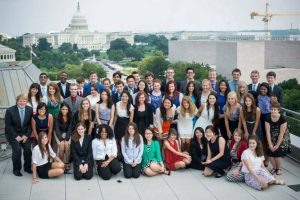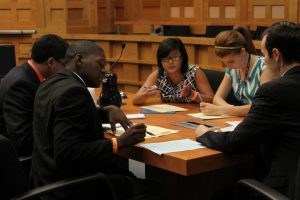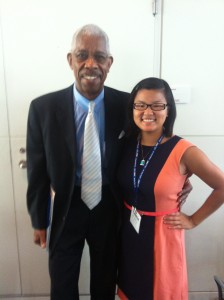Ever since I was in seventh grade, I have known I want to be a journalist. It started with Anderson Cooper, the dreamy older man with the deep blue eyes. I saw him report in “Planet in Peril,” a documentary which exposed illegal wildlife trading, the devastating effects of deforestation, climate change, and disappearing habitats. I wanted to develop writing and reporting skills to unveil similar injustices. I wanted to become a world-traveling journalist. So when I was presented the opportunity to apply as an Al Neuharth Free Spirit, I jumped at the chance. I wanted to immerse myself in the world of journalism and knew this program would be one of the best ways to do just that.
Throughout the application process, I was asked, “What makes you a Free Spirit?” and this question puzzled me. As a person who wasn’t extremely comfortable with talking to new people, I felt I was far from a Free Spirit. It took me awhile to think about how I was a Free Spirit myself. I’m not extremely outgoing. I don’t have the loudest voice. But I came to realize that I do have determination and that made me a Free Spirit.

The Al Neuharth Free Spirit and Journalism Conference of 2013 was held July 13-18. Fifty-one students, each representing one of the 50 states and the District of Columbia, gathered in Washington D.C. for the chance of a lifetime. The majority of the conference took place in the Newseum, which was founded by Al Neuharth. Neuharth, who also founded the conference, was the creator of USA Today, the first national newspaper, and Gannett. Though Neuharth passed away in April, the presence of his legacy was ever-present throughout the conference. His daughter, Jan Neuharth, and grandchildren, A.J. and Dani Neuharth-Keusch, took an active role in the conference, speaking to us about Neuharth’s life and how he had impacted their lives.
While in D.C., I made it my mission to go out of my comfort zone. Being someone who often doesn’t speak out loud, I challenged myself to find something to ask our guest speakers about. I listened intently and tired to learn as much as I could from everyone. I took notes upon notes. I even found myself talking to Dr. Rip Patton, a freedom rider from the ’60s, at dinner about his experiences growing up during an era of segregation and gradual integration. He is one of the most interesting people I have ever met, and if I hadn’t gone out of my comfort zone, I would have never gotten to know him so well.
In addition to asking questions, I also actively participated more. During our visit at the courthouse, I volunteered to be an attorney and participated in a mock trial. It was out of character for me to even raise my hand for such an activity, much less speak as a lawyer.

I stepped up and spoke in front of a real judge, stating my side’s opinion and answering questions that former Chief Judge Royce Lamberth asked of me. I proved to myself that I could be outgoing if I wanted to. I began to grow as a Free Spirit.
I also put myself out there when meeting the other Free Spirits. I first met representative of Vermont, Basundhara Mukherjee at the airport. She shared about her experience at the Asian American Journalism Association JCamp and we talked about our passions for journalism. Once we got to the hotel, we were greeted by more representatives and introduced ourselves. Even though I’m usually not very outgoing, I spoke with everyone and found myself very interested in what the other Free Spirits had done in their lives. I made 50 friends at the conference, and we all keep in touch to this day.
My favorite part of the conference was meeting Dr. Patton.

He was such an interesting person, and it was amazing for me to be able to meet someone who was directly affected by the Civil Rights Movement in the 60s. After he spoke at the Conference, he joined us for dinner, and I made sure to sit next to him. I wanted to know more about this controversial time period, and he had so many stories to tell. He spoke of writing his will before getting on the bus to Montgomery because many of the teenagers who rode the busses believed they were going to die. He talked about being a child and playing with the white children that lived near him. He described serving time in jail and the songs he and the other Freedom Riders would sing to keep their spirits up. His stories were captivating, and I forgot about the food sitting in front of me. I just wanted to learn more.
Moving out of my comfort zone, I even added to the conversation. I told him about the Normandy transfer and the fear that prevented some parents from accepting the transfer students. I explained what the town hall meeting had been like, and how shocked I had been by the reactions of some adults. I conversed with this man I had just met and learned so much. That evening, I didn’t just grow as a journalist, asking questions and inquiring details, I also grew as a person and a Free Spirit. Dr. Patton impacted my life and reminded me why I wanted to be a journalist–to report on injustices and make a change.
Overall, though the Free Spirit and Journalism Conference taught me a lot about journalism, it taught me the most about myself. I found that I am more independent than I ever knew; that I am capable of handling myself in the real world. I can be strong. I can go out of my comfort zone. I can be a Free Spirit.






![Banning Bitter Truths [Opinion]](https://FHNtoday.com/wp-content/uploads/2025/03/A5420F3C-5A62-4390-A0DE-112E5DAFB16D-e1743114102833-1200x1128.jpg)
![Si Pudiera Devolver el Tiempo [Personal Column]](https://FHNtoday.com/wp-content/uploads/2025/03/Untitled-design-1200x675.png)
![Solve the Real Problems Instead of Banning Phones [Editorial]](https://FHNtoday.com/wp-content/uploads/2025/03/Untitled_Artwork-1-e1742221427133-1200x686.jpg)
![A Mock Trial Christmas [Personal Column]](https://FHNtoday.com/wp-content/uploads/2025/03/Copy-of-Mckenna-Hudson-Tales-of-a-child-delinquent-6-1200x800.png)
![A Visit Inside An Artist's Mind [Personal Column]](https://FHNtoday.com/wp-content/uploads/2025/03/Copy-of-Mckenna-Hudson-Tales-of-a-child-delinquent-5-1200x800.png)